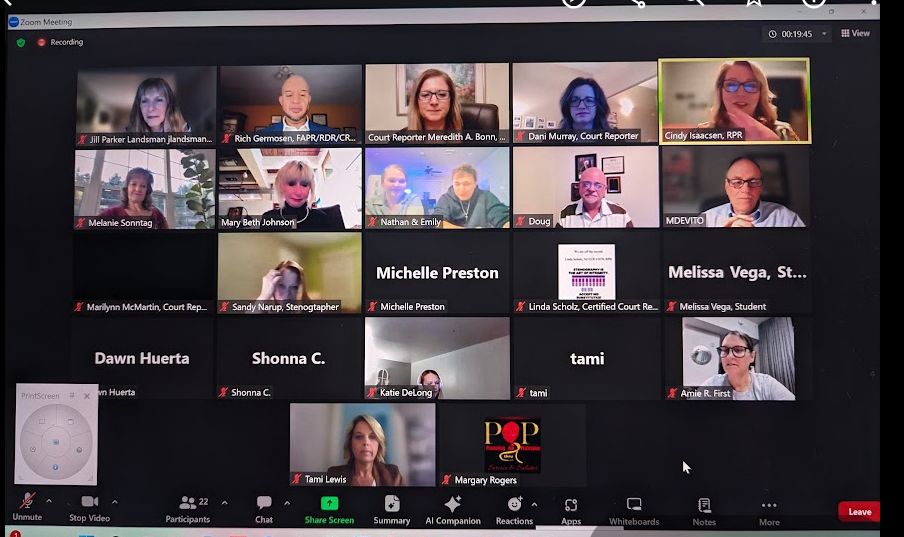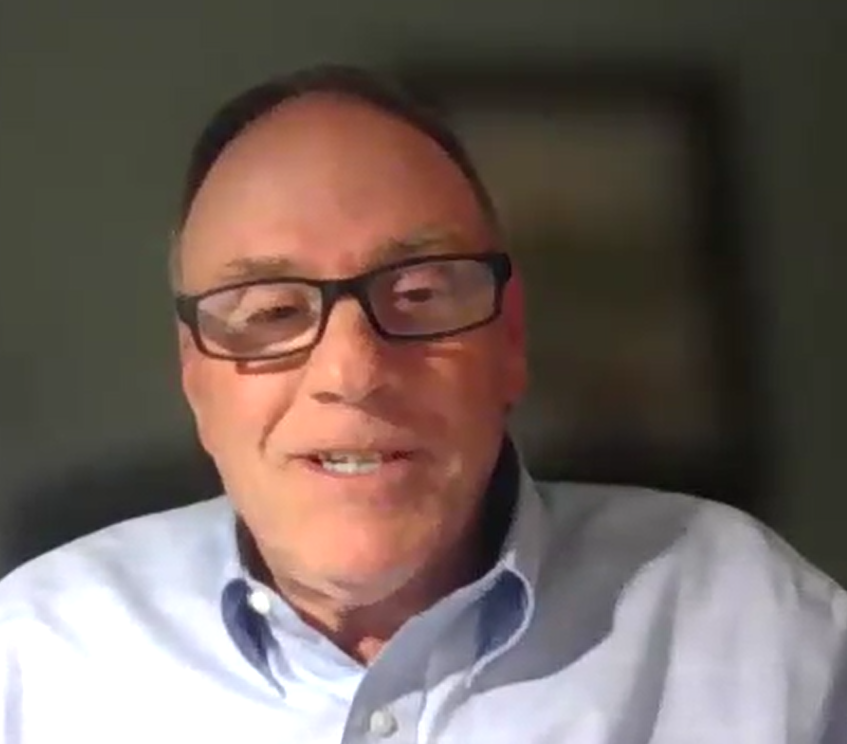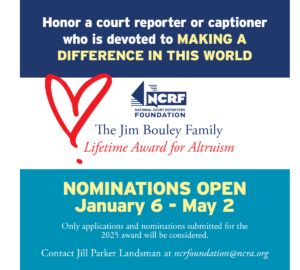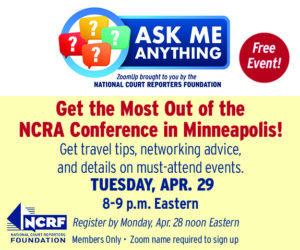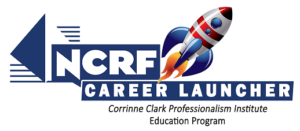By Jill Parker Landsman
Scaling up your court reporting or captioning career takes time and strategy. The view from the top is exciting, and the National Court Reporters Foundation (NCRF) leaders and donors want you to succeed in that climb.
The NCRF Ask Me Anything (AMA) ZoomUps were created to provide access to valuable information to help guide you in your professional journey. The Focus on Officials: AMA ZoomUp that took place last month offered information relayed by officials, administrators, and teachers who know the ins and outs firsthand.
Co-chair of the AMA Task Force, Cindy Isaacsen, RPR, an official from Shawnee, Kan., served as the moderator, smoothly balancing the points of view of the panelists with the questions from attendees. “No matter what season we are in, we can be successful,” said Isaacsen, who also serves as NCRA Vice President.
In addition to Isaacsen, the AMA Task Force includes Co-chair Meredith Bonn, RPR, CRR, from Webster, N.Y.; Rich Germosen, FAPR, RDR, CRR, of North Brunswick, N.J.; Early Langley, RMR, from Danville, Calif.; Sandy Narup, RPR, from Apopka, Fla., and Marjorie Peters, FAPR, RMR, CRR, of Alexandria, Va.
Register now for the next Ask Me Anything ZoomUp
Monday, Oct. 30 at 8 p.m. | Focus on Freelancers
Returning as an official after a 30-year freelancer stint, Melanie L. Humphrey-Sonntag, FAPR, RDR, CRR, CRC, from Cheyenne, Wyo., said she likes her employment benefits. “There has been a great improvement in my work-life balance,” she said. “I do not feel like I am working 24/7 as I did with freelance. Doing different cases has really improved my realtime. I qualified in the National Realtime Contest this year.”
Teaching court reporting to students at the Community College of Allegheny County brings immense joy and satisfaction to instructor Mary Beth Johnson, CRI, from Pittsburgh, Pa., who quoted teacher and astronaut Christa McAuliffe: “I touch the future. I teach.” McAuliffe was an American teacher and astronaut from Concord, N.H., who died on the Space Shuttle Challenger when it expoloded on Jan. 28, 1986.
A number of golden rule tips to follow were also recommended by Johnson: Being on time, being professional, and looking up every name. “Google is your best friend,” she added, as each name must be spelled correctly. Other important skills she noted were strong proofreading skills and dedication to the profession.
Johnson’s proud moment was introducing two former students of hers who sat side by side in class and remained side by side at the ZoomUp. Both serve as local officials in Pennsylvania: Emily Ricciardi and Nathan Sibley.
“I like stability,” said Sibley, “knowing what time you go to work every day. Still, there is variety with different judges each week.”
The duo represented young court reporters who are also successful officials. “I can rely on the paycheck. There are fantastic benefits. It is repetitive but also not repetitive,” added Ricciardi.
Tami Lewis, RDR, CRR, CRC, from Canton, Texas, recently served as a court reporter at an event that will now be cited in the history books. The Texas Senate acquitted state Attorney General Ken Paxton after a two-week impeachment trial on allegations of corruption. “While the Senate was deliberating the verdict, I was taking down 16 articles of impeachment,” she said. Sharing one headwind that she observes in her job, she said, “[In the courthouse] we don’t have a budget for subs. I am bound by [the judge’s] schedule.”
Panelist Michael J. DeVito from Pittsford, N.Y., is a retired N.Y. Supreme Court reporter and principal management analyst for the New York State Office of Court Administration Office of the Record. He cites that one great benefit of working as an official is a steady salary, with New York state paying wages every other week. He cautions court reporters to communicate professionally and not adopt shortcuts in language used in social media. He pointed out the importance of “knowing the right words. It is a rush to get this stuff out, but you want to take pride. You have to make a verbatim record. That is a challenge at times.”
The top benefits of serving as an official were clear to Dani Murray of Shawnee, Kan. “You get to see a case the whole way through. That is my jam, and that is why I became a court reporter. That is the best part for me.”
Murray also advises new reporters to develop relationships that will help improve their skills. “Have a mentor,” she said. “Do not be stagnant. Learn about your software, get more certifications, and challenge yourself.” All panelists agreed that certifications are recommended to rise in this profession.
For each day in the courtroom that goes well, there are days that are unforgettable. Isaacsen asked the panelists how they get through rough days. Bonn explained that difficult days are those when she transcribes the “victim statement when a young person has died, when the family gives their statements.” She said she reminds herself “it’s just words.”
Summing up the facts about court reporters, DeVito said, “There is a bright future. It is the best job in the country no one seems to know about.”
Humphrey-Sonntag’s quote from Abraham Lincoln applies to prepping for all practitioners: “I will prepare and someday my chance will come.”
Register now for the next Ask Me Anything ZoomUp:
Future Ask Me Anything ZoomUp:
- Tuesday, Nov. 28 at 8 p.m. | Focus on Captioners
Through such career guidance, court reporting and captioning students and interested practitioners will gain an edge by learning from panelists’ experiences and observations.

